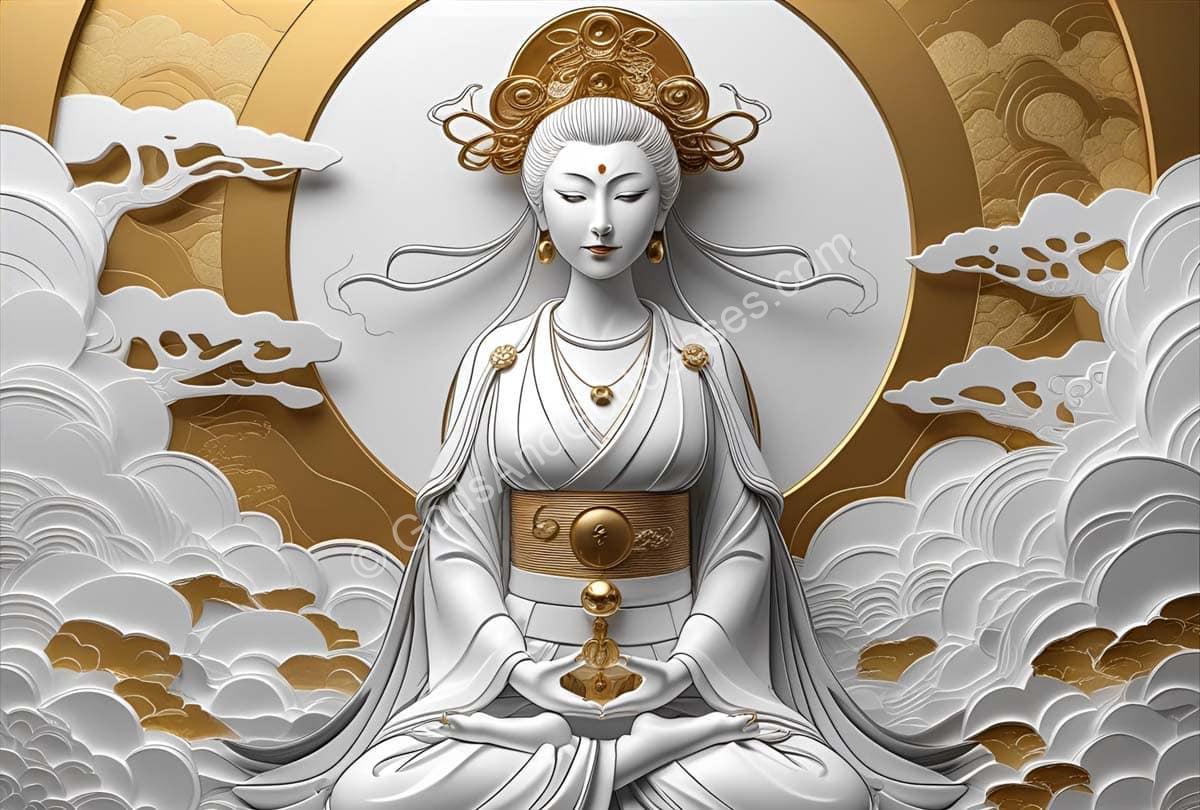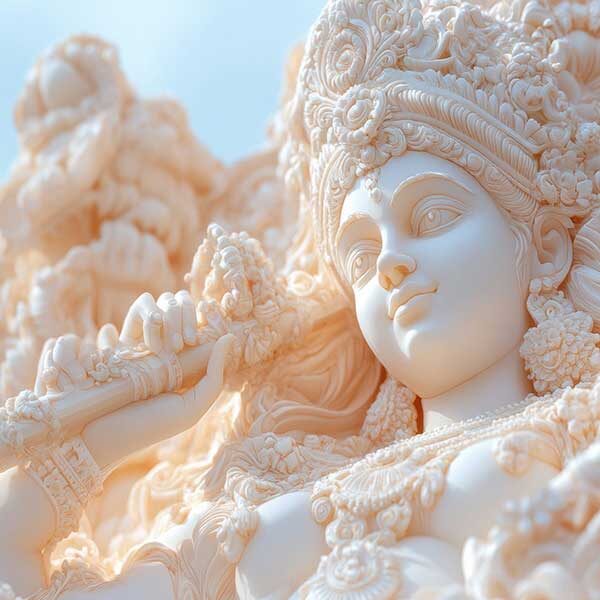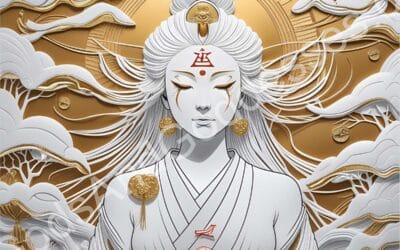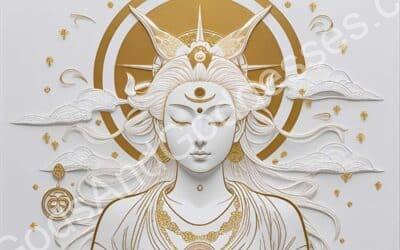Introduction: Why Benzaiten Matters
Among the kami of Japan, few goddesses embody grace and flow like Benzaiten, also called Benten. With origins in Hindu mythology as Saraswati, the goddess of wisdom and rivers, Benzaiten was adopted into Japanese Shinto and Buddhism, becoming a radiant figure of music, eloquence, prosperity, and water’s life-giving power.
At GodsAndGoddesses.com, we explore Mythology, Gods, and Goddesses—including Japanese Goddesses, Goddess Symbols, and Goddess Worship and Rituals—to show how figures like Benzaiten embody harmony, abundance, and divine inspiration.
“Benzaiten is the flowing river of wisdom, music, and abundance—wherever she moves, prosperity follows.”
Key Takeaways About Benzaiten
-
Benzaiten is the Japanese goddess of music, eloquence, fortune, and flowing water.
-
She originated from the Hindu goddess Saraswati and was adopted into Shinto and Buddhist traditions.
-
Common symbols include the biwa lute, water, serpents or dragons, and treasures.
-
She is the only female member of the Seven Lucky Gods (Shichifukujin).
-
Famous shrines include Enoshima Shrine and Itsukushima Shrine, where she is still actively worshiped.
Who Is Benzaiten?
Benzaiten’s name derives from Bentensama or Benten, meaning “goddess of eloquence.” She is often depicted as a beautiful woman playing the biwa (Japanese lute), symbolizing harmony and inspiration.
Her roles include:
-
Goddess of Music and Arts – Inspiring musicians, dancers, and poets.
-
Goddess of Fortune – Bringing prosperity, wealth, and success.
-
Water Goddess – Linked to rivers, lakes, and oceans, symbolizing purity and abundance.
-
Protector – Guardian deity, especially of coastal and island shrines.
Origins of Benzaiten
Benzaiten’s story begins in India, where she was known as Saraswati, goddess of wisdom, knowledge, and rivers. Through the spread of Buddhism, Saraswati traveled east into China and eventually Japan, where she was transformed into Benzaiten.
In Japan, her water associations grew stronger, blending with Shinto reverence for rivers, seas, and natural spirits. Over time, she also became associated with wealth and fortune, joining the Seven Lucky Gods (Shichifukujin) as their only female member.
Symbols of Benzaiten
-
Biwa (Lute) – Music, eloquence, and artistic inspiration.
-
Water – Rivers, seas, and flowing streams.
-
Serpent or Dragon – Protective spirits often accompanying her.
-
Jewels and Treasures – Symbols of prosperity and abundance.
See related: Goddess Symbols
Myths of Benzaiten
Protector of Enoshima
One famous myth tells how Benzaiten descended upon Enoshima Island to subdue a destructive five-headed dragon that terrorized the people. Struck by her beauty and grace, the dragon submitted, becoming her servant and protector of the land.
This story highlights her dual powers of compassion and authority.
Goddess of Flow and Fortune
Benzaiten is often invoked to bring prosperity to villages near water. Merchants and sailors prayed for her blessings, seeing her as the divine flow of fortune itself.
Archetypes of Benzaiten
-
The Muse – Inspiring art, poetry, and music.
-
The Provider – Flowing abundance and prosperity.
-
The Water Guardian – Protecting rivers, seas, and communities.
-
The Integrator – Blending Saraswati’s wisdom with Shinto kami.
See also: Goddess Types
Worship of Benzaiten
Benzaiten remains a highly revered goddess in Japan:
-
Shrines – Enoshima Shrine and Itsukushima Shrine are among the most famous dedicated to her.
-
Seven Lucky Gods Pilgrimage – Pilgrims honor her during New Year festivals to invite fortune.
-
Offerings – Music, coins, and prayers of gratitude.
-
Festivals – Celebrations near lakes and seas often honor her water aspect.
See more: Goddess Worship and Rituals
Benzaiten in Modern Culture
-
Religion – Still worshiped in both Shinto and Buddhist contexts.
-
Festivals – Central figure in rituals tied to water and fortune.
-
Cultural Symbol – Patron of artists, musicians, and entrepreneurs.
-
Global Appeal – Her fusion of Hindu, Buddhist, and Shinto qualities makes her unique.
External reference: Britannica – Saraswati
FAQs About Benzaiten
What is Benzaiten the goddess of?
Music, eloquence, fortune, and water.
Is Benzaiten originally Japanese?
No, she derives from the Hindu goddess Saraswati, but became fully integrated into Japanese tradition.
Why is she part of the Seven Lucky Gods?
As a bringer of prosperity, she represents the feminine principle within Japan’s most beloved pantheon of fortune.
Where is Benzaiten worshiped today?
At coastal and island shrines such as Enoshima and Itsukushima.
Conclusion
Benzaiten is the goddess of flow—of music, of water, of fortune, and of grace. She connects cultures and traditions, bringing together Saraswati’s wisdom, Buddhist compassion, and Shinto reverence for nature.
To honor Benzaiten is to honor the music of life itself—the rivers that nourish, the songs that inspire, and the prosperity that sustains.
Explore further with:
“Benzaiten flows like water—bringing wisdom, beauty, and fortune wherever she moves.”
- Odin God Story - August 24, 2025
- The Story of Ra: Egyptian Sun God and Creator - August 24, 2025
- Kraken: Mythological Sea Monster of the Deep - August 24, 2025




